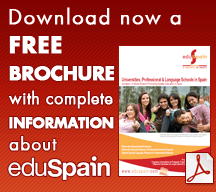Home > Study in Spain > Spain's Educational System
Spain's Educational System
In agreement with the new EHEA further education will be split into three levels: Degree, Master's and Doctorate. This structure is based on quality, mobility, diversity and competitiveness across a common credit system.
eduSpain helps students wishing to undertake a graduate or postgraduate degree in a Spanish university, providing them with all the relevant information, from the application process to the enrolment. Students coming from EU member countries, or non-EU countries who have signed up to the relevant International Agreements can enrol at Spanish universities without sitting an entrance exam (Prueba de acceso a la universidad –PAU), in the form of a transfer, providing that the student meets all the academic requirements of their own country with regards to entering its universities (See Appendix I of the Official State Bulletin which includes a list of all the countries and the academic requirements for enrolment into a Spanish university).
Spanish universities are either public or private and each has official qualifications (valid in the whole of Spain), each has its own academic offer with its own academic qualifications.
The Bologna Process has finally reached Spain. This process has overseen the change from a Spanish higher education system to the European Higher Education Area (EHEA)
The EHEA means that from 2010 University qualifications from all European countries will be guarantee convergent academic programs, which will mean an immediate acknowledgement of all qualifications in any part of Europe, as well as mobility between countries and continuous learning.
The official qualifications are structured into undergraduate and postgraduate degrees; therefore official postgraduate degrees which are already in place belong to this EHEA.
Official postgraduate degrees are divided into 2nd and 3rd cycles of studies. The 2nd cycle consists of a University Masters (1 or 2 years long), and the 3rd cycle is a Doctorate.
- Undergraduate Degree
- Master's
- Doctorate
- ECTS Grading Scale
Undergraduate Degree
These studies aim to provide the student with a general training in order to carry out activities of a professional manner. The official title gained will be Graduate.
Undergraduate studies are the first level of teaching in the new University order, which is reached with a Baccalaureate or equivalent qualification, and by passing the University entrance exam (PAU).
These studies last for four years and are equivalent to the sum 240 European credits (ECTS European Credit Transfer System). After the four years there is a job placement of which the credits (minimum 6, maximum 30) are included in the 240 credits.
Graduate qualifications are divided into the following categories: Arts and Humanities, Sciences, Health Sciences, Social Sciences and Tourism, and Engineering and Architecture.
The program of study for each qualification will contain a minimum of 60 basic credits in the first part, during the first years, of which at least 36 will be linked to the basic subjects established by the category to which the qualification belongs. These 60 credits will be recognized if the student then wishes to change to another qualification within the same category.
All universities will have to provide systems for information, orientation and welcome the new intake of students. These systems will have to include adequate help and support for any students that have special educational needs from a disability.
Master's
Once the Undergraduate degree has been completed there are two options:
- Find a job
- Continue with a Master's degree
Master's studies provide an advanced training, directed on one hand by an academic or professional specialization, and on the other, to develop research skills. The official qualification will now be known as a University Masters.
It is a specialized training that compliments the Undergraduate degree. It lasts 1 or 2 years (60 or 120 ECTS) and can be:
- Professional: To prepare for a job
- Research based: To prepare to continue with Doctorate studies
The Master's degree is completed after carrying out a task and public presentation which has an extension of a minimum of 6 credits and a maximum of 30.
Entry
- Anyone with an official Spanish University Degree.
- Anyone with a qualification from an Institute of Further Education from the EHEA, which permits entry into a Master's degree in their own country.
- a)Further Education qualifications from non-EU countries that do not need ratification, with previous verification that these studies form an equivalent level of training to that of official Spanish qualifications, and that they allow entry to Postgraduate education in the country of origin.
The third option does not recognise nor ratify the previous qualification, but when the studies are completed, the Master's title obtained will have complete official validity.
Admission
- To be admitted to a masters the student must match the specific requirements and criteria that the masters degree or University asks for.
- The university will include the processes and admission requirements in its study program.
- In the case in which a student has special needs from a disability, the processes must include support mechanisms and adequate advice.
Doctorate
These studies provide advanced research training for students.
They are made up of 2 sections:
- Training.
- Research, which includes the production and presentation of the doctoral thesis.
To enrol on a Doctorate degree, the student must meet the following requirements.
Entry
To gain entry onto a Doctorate degree the student must have gained at least 300 credits (ECTS). There is a variety of access routes:
- The requirements to gain admittance on a Doctorate program during its training period are the same as those for a Master's program.
- To gain admittance to the research period, the student must have an official Master's qualification, or equivalent from a further education institution from within the EHEA.
- Students from outside the EHEA can also gain admittance without ratification, but with prior certification that the qualification previously gained is equivalent to a university master's which permits access to Doctorate studies in student's own country.
- Students can also gain admittance by fulfilling one of the following conditions:
- By gaining 60 credits through one or various Master's degrees
- In exceptional cases, students can gain admittance on to the research period if they have gained 60 credits at postgraduate level through formative activities not included in a university masters
- Students with a graduate degree of 300 credits.
Admission
The university will establish the processes and admission criteria for each doctorate program.
In the case in which a student has special needs from a disability, the processes must include support mechanisms and adequate advice.
Students admitted to the research period will matriculate in the university every academic year, where they will be granted the right to academic tutelage, the use of resources necessary to carry out their work and the rights associated with the rules for doctorate students.
At the beginning of the research period, universities will send the corresponding qualification, which will be considered as the empowering document for the internship contract for the researcher in training.
ECTS Grading Scale
| Qualification ECTS | Spanish Mark | Spanish Definition | Spanish Academic University Record |
| A | 10 | Matrícula de Honor | 4 |
| B | 9 - 9.9 | Sobresaliente | 3 |
| C | 7 - 8.9 | Notable | 2 |
| D-E | 5 - 6.9 | Aprobado | 1 |
| FX-F | 0 - 4.9 | Suspenso | 0 |
Matrícula de honor: the highest mark available and awarded to only a small number of students who have demonstrated an excellent performance.
Sobresaliente: Awarded to students who have demonstrated a very good performance.
Notable: Awarded to students who have demonstrated an average performance.
Aprobado: This mark indicates that the student has passed the subject with a sufficient level.
Suspenso: this indicates that the student has not passed the subject and that they must re-take the exam. The number of examination periods is limited.

